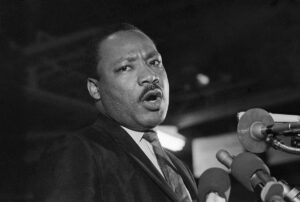
Credit: Bettmann / Getty
On a hot summer day in 1963, Martin Luther King Jr. fervently delivered his “I Have a
Dream” speech on the steps of the Lincoln Memorial to an audience of 200,000 in
Washington D.C. and millions around the country. This moment has defined his legacy
in the decades since, and to many, represented the pinnacle of his crusade for social
justice in the United States.
However, his fight was far from finished.
Over four years passed between King’s iconic speech and his assassination in April
1968, and throughout this span, his advocacy for liberation grew in the face of the
Vietnam War and economic inequities further dividing the nation. King even revealed in
a May 1967 interview with NBC News correspondent Sander Vanocur that “that dream I
had that day, at many points, has turned into a nightmare,” a testament to how much the
nation — and King himself — had changed in the years since his famous speech.
The United States were anything but during the latter half of the 1960s, with the hopeful
dreams of voting rights and integrated water fountains that King had worked towards in
the prior decade making way for the forceful demands of the anti-war and Black Power
movements. King was keen to adapt his mission with the times, making his first major
public dismissal of American involvement in the Vietnam War on April 4, 1967, a year to
the day before his death.
“Now, it should be incandescently clear that no one who has any concern for the
integrity and life of America today can ignore the present war. If America's soul
becomes totally poisoned, part of the autopsy must read: Vietnam,” King declared to the
crowd of 3,000 packed within the walls of New York City’s Riverside Church.
The United States’ military presence in Vietnam came about as a part of the
government’s mission to quell the spread of communism into South Vietnam amid
widespread fear and panic surrounding the emergence of socialist ideals into the West.
King saw his share of detractors blindly accuse him of being a Communist, and while he
frequently defended himself from these accusations — often pointing at the inevitable
clashing between Communism and Christianity as reasoning to denounce the doctrine –
King adopted economic ideals in his later years that thoroughly rejected the viability of
Western capitalism in favor of promoting social programs and campaigns for economic
equity.
King announced the plan for a Poor People’s Campaign in November 1967 that would
see 2,000 poor people gather in cities across the country demanding jobs and a higher
minimum wage as a “middle ground between riots on the one hand and timid
supplications for justice on the other.”
King would not live to see the campaign he coined come to fruition, but it would be
carried out in the months following his death by the Southern Christian Leadership
Conference that he founded 11 years prior.
In a 1967 address to the National Conference of New Politics, King spoke of the
“sickness of racism, excessive materialism and militarism … that has been lurking within
our body politic from its very beginning.”
It is in this era that King’s fight for justice revealed itself as much more than a matter of
race; instead a multi-layered set of sins that the United States needed to answer to
before, in King’s words, “America may go to hell.”
In a 2018 article published in The Guardian, Cornel West, famed philosopher and
political activist, wrote: “If we really want to know King in all of his fallible prophetic
witness, we must shed any neoliberal soul craft and take seriously — in our words and
deeds — his critiques and resistances to US empire, capitalism and xenophobia.”
It was the convergence of these “three evils” — the violent racism levied towards the
Black community in the United States, the struggle to gain economic ground and a
foreign intervention that served as a distraction from the domestic issues that plagued
the nation — that Martin Luther King Jr. gave the final years of his life to fight against,
and in doing so, show that he was much more than the simplified portrayals of his
legacy in the decades since.
King’s legacy lives on through his children, who have been consistently vocal in
defending their late father’s progressivism and continuing the fight he once led during
their infancy.
“I’ve lived most of my adult life with people taking my father’s legacy out of context, so
I’m beyond getting angry,” Bernice King, the youngest child of Martin and Coretta,
revealed to Oliver Laughland of The Guardian in 2020.
Martin Luther King Jr. is a man defined not by a singular speech, nor by a federal
holiday, but by a set of progressive ideals that he fought for and the fervor with which he
fought for them. This eternal fight evolved, growing more layered during the latter years
of his life, and continued through his lineage into the modern day.